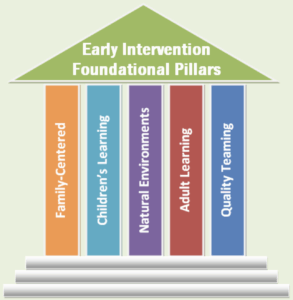 Published by the Early Intervention-Early Childhood Professional Development Community of Practice in 2015 (which, in 2024, became part of the Division of Early Childhood’s (DEC) Professional Development Community of Practice), the Foundational Pillars of Early Intervention is a facilitator’s guide to five critical topics all early intervention service providers and coordinators need to be familiar with. The module includes video clips, reflection questions, and guided practice activities. If you are responsible for staff development, this resource is a gold mine. It’s chocked full of useful information, training ideas, and countless resources, and it can be accessed through the links above, at Universal Online Part C EI Curriculum, or on this useful one-page flyer. Be sure to bookmark at least one of those websites; you’ll be glad you did!
Published by the Early Intervention-Early Childhood Professional Development Community of Practice in 2015 (which, in 2024, became part of the Division of Early Childhood’s (DEC) Professional Development Community of Practice), the Foundational Pillars of Early Intervention is a facilitator’s guide to five critical topics all early intervention service providers and coordinators need to be familiar with. The module includes video clips, reflection questions, and guided practice activities. If you are responsible for staff development, this resource is a gold mine. It’s chocked full of useful information, training ideas, and countless resources, and it can be accessed through the links above, at Universal Online Part C EI Curriculum, or on this useful one-page flyer. Be sure to bookmark at least one of those websites; you’ll be glad you did!
The ICC-Recommended Early Start Personnel Manual (ESPM) describes core knowledge and role-specific competencies needed for early intervention service provision, incorporating current research and evidence in the field of early intervention. Click here to access the ESPM. Scroll down to find the ESPM entry.
This resource is related to the following ESPM knowledge-level competencies:
- Core Knowledge (CK):
- CK1: The dynamics of family systems including cultural, linguistic, and socio-economic factors influencing family function and care for all children.
- CK10: The significance and study of team models, collaboration, and relationship-based practice.
- Evaluation and Assessment (EA):
- EA7 (EIS): Knows strategies to determine child and family strengths, typical routines and activities, and preferred teaching and learning styles.
- Individualized Family Service Plan Development and Review (IFSP-i):
- IFSP-i2 (EIS): Understands the individual nature of child learning styles and the importance of adapting intervention strategies.
- IFSP-i7 (EIS): Understands roles of various disciplines and models of teamwork and collaboration that integrate strategies from multiple disciplines.
